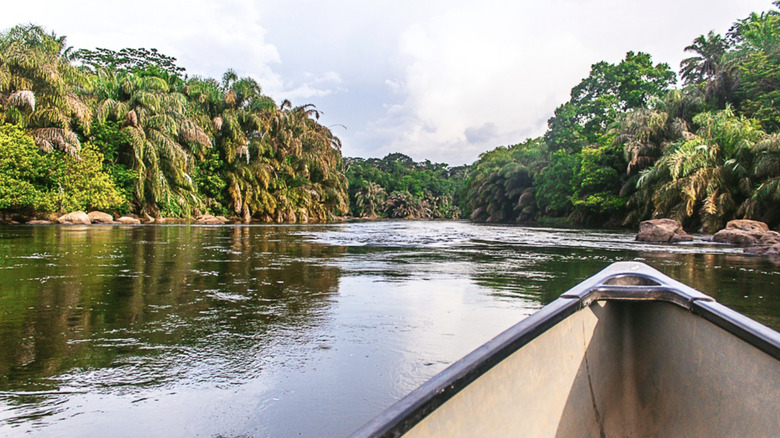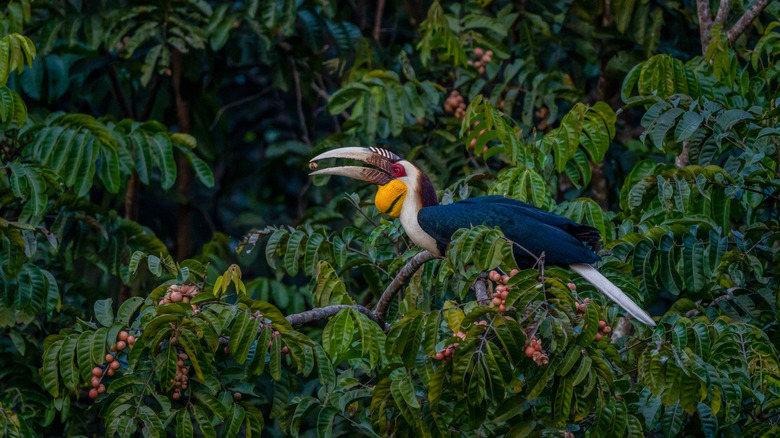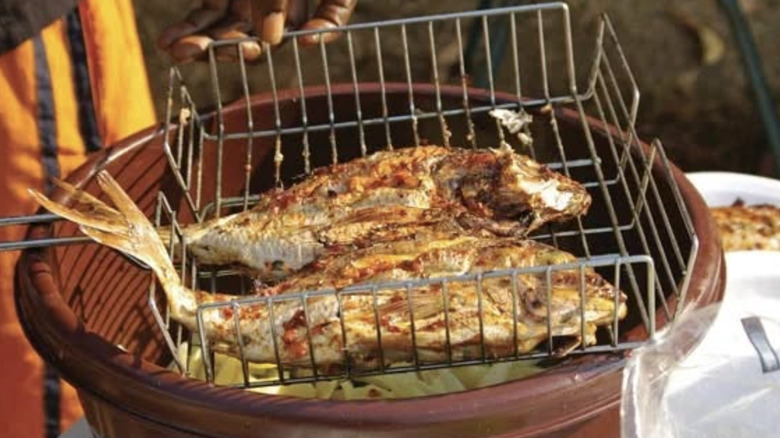This Remote Island Was Ranked The Best Hidden Gem For 2026 Thanks To Its Wildlife, Rainforest, And Few Crowds
Hidden gems don't usually come with signs pointing the way, but modern times call for modern solutions. Per the "Not Hot List" from Intrepid Travel, Tiwai Island just took the crown as the No. 1 best-kept secret to explore in 2026. At roughly 3,000 acres, this slice of West African paradise is located in Sierra Leone — one of the world's least-visited countries, welcoming just 69,000 international visitors in 2023.
The timing of this publicity couldn't be better for this jungle-wrapped sanctuary surrounded by the Moa River. Spotlighted in 2025 when the Gola-Tiwai Complex was officially listed as a UNESCO World Heritage site, Tiwai Island represents all you could crave from a travel destination: authentic experiences, wildlife encounters, amazing food, and meaningful community engagement. Despite these draws, the region remains shockingly under the radar, despite other West African gems slowly emerging from obscurity, like the Bijagos Islands with their beaches and hippos and the golden beaches and abundant wildlife of Togo.
A visit to Tiwai Island is an adventure for the thoughtfully curious, not the merely restless (though it's that, too). Here, sightseers can explore an increasingly rare kind of destination that exists primarily as an ancient ecosystem rather than a place full of convenient, predictable tourist amenities. On this island, entertainment comes courtesy of hornbills and hippos, and the most pressing decision you'll face is whether to take a morning forest walk or an evening river tour.
What Tiwai Island can teach you about adventure
You know you've stumbled onto something special when 11 different primate species call the same place home. The entirety of Tiwai Island is a wildlife sanctuary with one of the world's highest concentrations of primates, including species like the endangered Diana monkey and the western chimpanzee, which coexist in what remains of West Africa's ancient Upper Guinea Rainforest. The island is also home to over 135 bird species and more than 700 plant varieties, many with medicinal properties that local communities have relied on for centuries.
With how rustic everything on the island is, it's easy to assume there isn't much to keep you busy. Don't be fooled, though. There are more activities here than most people expect, with over 31 miles of pathways weaving through the forest — after all, Tiwai Island does mean Big Island in Mende. If you have something specific in mind, like spotting one of the eight different hornbill species, all you have to do is ask the sanctuary's staff to arrange a targeted trek with an experienced guide who knows exactly where to look during the midday heat.
When the forest heat starts getting to you (and it likely will), the river tours offer sweet relief with serious adventure payoff. Head upstream for heritage sites, or brave the downstream rapids for waterfall views and turtle spotting. But it's absolutely worth booking the night tour if you want a chance at seeing the pygmy hippopotamus, a creature so rare it exists only in these Gola rainforest waters. During dry season, you can cap off your river adventures with a swim at the northern tip beaches, though you might have to share the shore with river otters who use them as playgrounds.
Engage with local cultures and ecosystems on Tiwai Island
The people you meet on Tiwai Island are as central to the island as the canopy and the river. The ecotourism camp is run by the Sierra Leone division of the Environmental Foundation for Africa (EFA), and every dollar you spend directly funds the eight communities surrounding Tiwai, from Mapuma and Ngjema to Kambama and Boma. Instead of just consuming a wild place, your stay helps sustain the communities who protect this island from logging, mining, and poaching.
The Tiwai Heritage Trail takes this concept even further, offering multiday experiences where you'll travel the old-fashioned way. You'll hike bush paths, ride across the river on a canoe, and camp under stars that shine brightly without light pollution. Visits to these host communities allow a deeper dive into Mende culture, learning traditional activities like country cloth weaving and wood carving from people who've been perfecting these crafts for generations.
To get the full jungle immersion experience, you can sleep in a tent or, if you prefer, claim a room in the lodge, equipped with solar lighting and basic amenities. You'll dine on scrumptious Sierra Leonean cuisine prepared by community members with ingredients sourced from the island itself — think locally grown rice with stews and sauces. There's also the possibility of local fruits like mango, papaya, or breadfruit if they're in season. Meals cost LE70 (about $1.50) for African plates and LE90 (just under $1.90) for European-style food, which has to be one of the world's best bargains for eating this well in such an extraordinary setting.


